John Winston Lennon was born in Liverpool on 9 October 1940. A founder member of The Beatles, and their singer, songwriter and guitarist, he was murdered in New York City on 8 December 1980.
The early years
Lennon grew up with his aunt Mimi and uncle George in a house called Mendips, at 251 Menlove Avenue, Liverpool. He kept in close contact with his mother Julia Lennon until her death in 1958, but had little contact with his father Alf.Julia Lennon taught her son to play the banjo, and they shared a love of Elvis Presley’s music. The first song he learned to play was Fats Domino’s ‘Ain’t That A Shame’.
In 1957 she bought John his first guitar, a Gallotone Champion acoustic “guaranteed not to split”. Julia ensured it was delivered to her house rather than Mimi’s, as her sister was disapproving of music. She told her nephew, “The guitar’s all very well, John, but you’ll never make a living out of it”.
Lennon’s first school was Mosspits Lane Infants School in Wavertree, Liverpool, which he attended from November 1945 to May 1946. He then changed to Dovedale Primary School, and upon passing his 11 Plus attended Quarry Bank Grammar School (1952-1957). He formed The Quarrymen in March 1957, and in July the same year met Paul McCartney at the garden fete at St Peter’s Church in Woolton, Liverpool.
The pair quickly bonded, and began rehearsing and writing songs together at McCartney’s home at 20 Forthlin Road. Lennon’s first completed song was ‘Hello Little Girl’, later a hit for the Fourmost. McCartney also introduced Lennon to George Harrison, and convinced him to let the young guitarist join the group, eventually named The Beatles after a series of other names were rejected.
We all looked up to John. He was older and he was very much the leader – he was the quickest wit and the smartest and all that kind of thing.
Lennon failed all his GCE O level exams, but with the help of his head teacher was accepted into the Liverpool College of Art. There he met Cynthia Powell, who became his first wife. They married after she became pregnant with their son Julian, who was born on 8 April 1963.
With The Beatles
An unruly pupil, Lennon dropped out of college before his final year. By this time, however, The Beatles were working hard to establish a name for themselves. Initially managed by Allan Williams from May 1960, they were booked later that year to play at the Indra club in Hamburg. The trip wasn’t a success: McCartney and drummer Pete Best were accused of arson after a fire started in the cinema where they were staying, and George Harrison was deported for working while under the age of 18. Lennon returned to Liverpool after his work permit was revoked.
The Beatles returned to Hamburg after Harrison turned 18, and from April 1961 began another residency. While there they recorded ‘My Bonnie’ with singer Tony Sheridan.
In 1962 they returned to Hamburg to play at the Star Club, and in May were signed to EMI subsidiary label Parlophone. Their first single, ‘Love Me Do’, was released on 5 October.
By the following year The Beatles had become a worldwide phenomenon, under the auspices of manager Brian Epstein. Their success looked unstoppable, though in March 1966 Lennon was interviewed by journalist Maureen Cleave, who quoted him as saying:
Christianity will go. It will vanish and shrink. I do not know what will go first, rock ‘n’ roll or Christianity. We’re more popular than Jesus now. Jesus was all right, but his disciples were thick and ordinary.
The quote led to protests in the southern and midwest US states, which included public bonfires of Beatles records and memorabilia. Lennon issued an apology of sorts at a Chicago press conference in August 1966, saying:
I was not saying whatever they’re saying I was saying. I’m sorry I said it really. I never meant it to be a lousy anti-religious thing. I apologise if that will make you happy. I still do not know quite what I’ve done. I’ve tried to tell you what I did do, but if you want me to apologise, if that will make you happy, then OK, I’m sorry.
By this time The Beatles had long tired of the demands of Beatlemania and the frenetic pace of touring. Lennon later wrote:
I always remember to thank Jesus for the end of my touring days; if I hadn’t said that The Beatles were ‘bigger than Jesus’ and upset the very Christian Ku Klux Klan, well, Lord, I might still be up there with all the other performing fleas! God bless America. Thank you, Jesus.

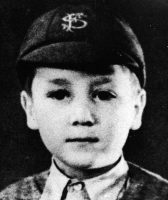
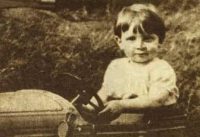
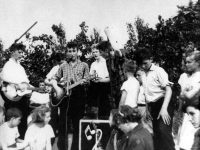
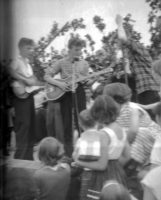
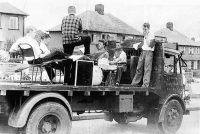

John was one of the best musicians of all time, possibly the best, certainly a genius.
The greatness of John Lennon as i see it:
–The increasing tension. For example I Should Have Known Better. Before Lennon, all pop music structure was AABA, where the tension decreased in the middle part B. But with Lennon the tension from the verse continued in the middle part. Besides that, in this song it is not only a key change in the transition to the middle part, it is even a little key change in it. The increasing tension was what first characterized The Beatles. The first single where the verse lacked this increasing tension was Can´t Buy Me Love. (But the chorus is OK). I didn´t know then it was a McCartney composition. – Other ways of increase the tension by Lennon is to pack together several little songs. Happiness Is A Warm Gun consists of three or four songs, and Bring On The Lucie consists of three songs. –All You Need Is Love has another way: First talking, then repeating half singing, then singing, and finally the climax in chorus.
–The melody does not changes, but the background. For example in Strawberry Fields Forever and in Julia the singing melody uses the same notes, but instead the accompaniment changes! Listen to Puccini. He got tired of his sang melodies in Boheme and in Tosca he composed a lot where the sang melodies are often on the same notes, but the background changes instead. The effect can be stronger.
–Octave Leap. For example, in the middle part of Please Please Me, Lennon makes an octave run in “…it´s so hard to reason with YOU…”, the climax of the song. George Martin didn´t understand the quality in that. In his orchestration of it in Off The Beatle Track, Martin excludes the octave, the most important bit of the song!
–Verse and resolve. Typical for Lennon is a melody followed by a resolve, for example in No Reply “…I saw the light!”…and in Girl “girl! girl!…”. Lennon said that “a good song must have climax and resolve”.
–Only one chord. In Tomorrow Never Knows there is only one chord, or bass note, an innovation in pop music. In the Middle Ages it was common with that bordun note, an unchanged bass note. When Lennon played the song the first time for George Martin, Martin didn´t like it.
–Whole-tone scale. Most scales have both whole step and half steps between the notes in an octave. In the verse in Norwegian Wood, there is most whole steps, and that´s like the impressionists, for example Debussy. It sounds very clean.
–Church Modes. A Hard Day´s Night is written in the mixolydian mode, an ancient vocal scale, preserved in British, Irish and American folk song. –If you play the beginning of Please Please Me slowly, you can hear the similarities with the Westminster bells ringing. When Lennon was a little boy, he loved visiting the divine services. Afterwards he used to improvise anthem music. Westminster bells could unconsciously have inspired him to the beginning of Please Please Me. There is also anthem music in the beginning of All You Need Is Love: “love love love…”.
–The lamentation second. A little half step up in the scale. And that´s to indicate a pain. In All You Need Is Love Lennon sings the refrain twice unchanged and then suddenly the third time, rises a little, a very expressive and important step up. That step up started in the baroque epoch, and was called The lamentation second. When Lennon played it the first time to George Martin, Martin didn´t like it. He leaned towards McCartney and muttered: “It´s certainly repetitive”.
–From darkness to light. Happiness Is a Warm Gun starts with a little melancholy, and ends with enthusiasm.—In the middle part of I Am The Walrus the darkness switches over to light: “sitting in an English garden…”. And the transition from the chaos and darkness in Revolution 9 to the light in Good Night. That is very typical in Wagner´s music. I think that temperamentally the two were similar. And I think Wagner would have loved the arrangement in Glass Onion.
–Suggestive and hypnotic music. With small intervals between the notes in combination with some dissonance chord, Lennon can create a suggestive and hypnotic feeling in for example Across The Universe. It is more like Wagner than pop music.
–Few notes. With few, but effective notes, Lennon can create more feeling than McCartney with all his notes, for example in If I Fell and Love.
–A melody sang three times, in succession, with just a little change every time. When you hear it you can get frustrated or desperate not getting out from the melody. That we have in the middle part in I Call Your Name and in the middle part in And Your Bird Can Sing. And at the same time the melodies are stick together with a countermelody at the guitar. Rather hypnotic
get a life u spent way tooooooo much time on this
When does healthy admiration become obsession?
Live and let live. This man is happy writing what he wrote, and his chosen subject was a brilliant choice: the musical genius and founder of the Beatles, John Lennon. YOU are the one who needs to get his own life.
Wrong , Tony. Johan spends a great deal of his time throughout these blogs with his obsessive love of Lennon and obsessive ignorance/hate of McCartney, this with opinions and self-created thoughts presented as fact with no corroborating sources or quotes.
Johan is indeed in need of a life; dog and Robert (particularly) know of what they speak.
Thank you Mike.
Is there a problem with someone wanting to inform other people of famous people? I think it is interesting
beautiful, are you a writer?
Thank you.
I am not a writer.
I just happened to be paralyzed when I heard Please Please Me and Do You Want To Know a Secret the first time.
John Lennon will never die.
Much of pop and rock music, including heavy metal, is written in the mixolydian mode. As for the rest, you have mischievously selected aspects of music theory to suit your argument. I’m not fooled and I suspect many others aren’t either.
From what I can gather a lot of what makes John Lennon’s Beatle songs musically interesting comes from Paul Mccartney’s involvement (Tomorrow Never Knows, Come Together, A Day in the Life). This is made clear when you look at their solo works.
If you want to talk about Lennon’s genius talk about his lyrics, which flow wonderfully and are full of wonderful imagery. Across the Universe is the best example of this and might very well be Lennon’s best work (it’s also my favorite Beatles song, which is amazing since Paul is my favorite Beatle not John).
I agree! I love John Lennon
When John is still living, I always wish for a Beatles reunion. The day John Lennon died, my wish & hope for their reunion also died. 🙁
All I can say is that it still breaks my heart to know John is no longer here. I was 17 when he was senselessly murdered. I can still remember it like it was yesterday. John is the best musician ever, sadly we only got a small sample of his work. He is so greatly missed by so many. We will always have you in our hearts and mind through your creativity. I so glad you were with us as long as you were.
You forgot to mention the family home before he moved in with his aunt Mimi. He originally lived at 9 Newcastle Road, Wavertree when he was a little boy.
That insect that took him away from his family,friends and us should never be mentioned by name.Throw him on the dustbin of history,that useless git.
May the Lord Jesus, bless and keep your family and friends. I feel your pain. I suppose John had finished his course here on earth, so let’s look forward to seeing him there.
John said this out of pure honesty. At the time, The Beatles were bigger than Jesus.
I think Plastic Ono Band is one of the best albums ever. Someone at the height of his fame exposing his vulnerabilities and pain. Remarkable.
I read some where that the night that John got shot Yoko said to the doctors or the news reporters that she didn’t want to announce his death on the tv right away because she said Sean was in front of it.
If you were here today…
…you’d love CD’s, email, and trolling on the Internet. Miss you, John. 🙂
that hurt more than it should have
He was controversial yet spiritual. Many never understood him. People misunderstood his words. He would use power of communication to read people. This is partly what resulted to his shooting. He knew folks hated him anyway.
He was an amazing singer. I saw John ,Paul, George and Ringo 1966 in Essen/ Germany. I will never forget the concert, when i was sixteen!!!
John was a true genius. However his most blatant act of stupidity was when he took up with Yoko. I still blame her for being one of the primary reasons for him wanting to leave the Beatles. It’s still a head scratcher to me why he was attracted to her. She had no real talent, she sang like a cat getting it’s tail pulled, her looks were a 2 on a scale of 1-10, and she was dumb as a stump. I will always believe that she somehow brainwashed him.
True. As George Michael sang: “turn a different corner and we never would have met.” I,too, wish John had turned a different corner. He might even still be alive.
I have been a Beatles fan all my life. There music was what helped me when I was growing up. John Lennon will always be a hero to me and I’ll be forever grateful for all of them in my life!
Well, Ono was from a wealthy family and as for her being all those great things you have mentioned….you are probably righ…Japan has the worst bands ever becoming famous just because Japanese tend to like crappy music.
Whatever or whoever Yoko might be, we should respect her simply because John respected her, and she probably saved him from dying of an OD in 69/70. However, her role in the murder is equivocal, and she couldn’t save him from Ronald Reagan’s minions. I agree with Paul, the assassin’s name should be forgotten, he was just a tool.
Ronald Reagans minions? Really, Manteau? Politics has no place here but if you really want to do this I’m game.
This site is intended to celebrate the Beatles’ legacy, which really centers around intimate and universal love. What ironic heartbreak that the comment section is soiled by haters and goons.
John Lennon was probably the most brilliant and prolific music composer of the 20th century. With that brilliance comes a certain inability to relate much as Edison, Tesla and Einstein had difficulty relating. They all shared the commonality of being misunderstood. The man was genius and should there be any doubt look at what he has written and its social impact. He and the rest of the Beatles changed the face of music forever.
I like John Lennon, but the most brilliant and prolific composer of the 20th century is probably George Gershwin (discounting classical music) and I would rank Cole Porter, Bob Dylan, and several others above John Lennon.
Yeah, but let’s hear those other composers sing!
On several occasions when I have attended a wedding what song did they play? Not Porter, Dylan, Gershwin or McCartney! John Lennon’s Grow Old With Me.
you are right
Dear Warptek, John had been an fervent supporter of Jimi Carter back in 1976., He had been an undesirable alien in the US of A from 1972 to 1975, when he eventually was granted his green card. He had won…too easily against a disgraced Nixon. In the meantime, John had nothing to fear from Carter’s team. But in November 1980, two things happened almost at the same time : The election of Ronald Reagan and John’s own return to the forefront of the pop*rock scene. You know what happened.
Now, if you say politics are a forbidden subject here, we should never talk about John at all! I hate politics, but I’m convinced ( Like Sean ) that John Lennon’s assassination was a political one.
In November of 1980, two things happened almost at the same time: John’s return to the forefront of the pop*rock scene and the “Who Shot JR” episode of Dallas. You know what happened …
he was a really good friend of mine
I noticed a mistake and would like to correct it politely.
John’s first school was actually Mosspits County Primary School. He was expelled in 1946 for misbehaviour and then enrolled in Dovedale Road Primary School. My source is ‘An Intimate Day by Day History’ by Barry Miles.
Time really works for Lennon. His compositions can age better.The tendency in later years in the voting of The Beatles best 20 songs, Lennon´s compositions always are dominating, with for example:
–Strawberry Fields Forever,
–Come Together,
–Don´t let Me Down,
–I Am The Walrus,
–Revolution,
–A Day In The Life,
–Help,
— Rain,
–All You Need Is Love
and don´t forget Hey Bulldog,
a song that George Martin and McCartney stopped being released as single! and now there is a long story of that classic Lennon song in You Tube!!
Today Harrison´s songs Something, While My Guitar Weeps and Here Comes The Sun are equally popular as McCartney´s most popular songs!!
And Lennon´s solo songs are today more played than McCartney´s, for example:
–Jealous Guy,
–Imagine,
–Woman, –
–Instant Karma,
–Give peace a Chance,
–Love,
–A Working Class Hero,
–Grow Old With Me (on weddings nowadays).
This Lennon´s success is despite George Martin´s always patronizing of him. George Martin preferred McCartney´s conventional and “vertical” melodies.
I don’t know why people persist in describing John’s upbringing as harrowing or tragic. After WW2 there were many children of John’s age, taken from institutions in Liverpool and from dysfunctional family situations, babies to teenagers, who were shipped off to the white commonwealth countries for a supposedly better life. While many did get this, others were horribly abused, physically, sexually, and mentally in foster homes and catholic institutions. Some of these people from John’s generation grew up so psychologically damaged they were institutionalised for the rest of their lives. The rest grew up effectively stateless and denied British citizenship to return to their place of birth and their families. It was years before they received any compensation from the British government and is one of the most shameful episodes in post war British history. John Lennon had a lucky escape. He came from a broken home and that was extremely sad but he was raised by people who loved and protected him and provided the best for him that they could. He grew up to be an angry young songwriter, no doubt about it, but I sometimes sensed that John himself was gaining perspective with increasing maturity before he was senselessly murdered.
In the praised film about The Beatles Eight Days A Week by Ron Howard from 2016, Lennon´s songs are dominating: Please Please Me, You Can´t Do That, A Hard Day´s Night, If I Fell, Help, Ticket to Ride, It´s Only Love, Day Tripper, I´m A Looser, Girl, Norwegian Wood, Nowhere Man, I´m Only Sleeping, Tomorrow Never Knows, Don´t Let Me Down. When they took up the recording of Sgt Pepper, they played Strawberry Fields Forever, Lucy In The Sky With Diamonds and A Day In The Life, no other songs from that album,but at the same time there is a big picture of McCartney.(formerly a very common typical situation).
There’s a fine line between healthy admiration and worrisome obsession as another commentator indicated here.
Without McCartney, there would’ve been no Lennon. And vice-versa.
Said and done – concisely and simply.
Johan-Thank you once again for your willingness to praise John to the heavens and criticize Paul to no end. Your opinion and you are entitled to it. But, it’s old and repetitive and boring. The Beatles were John, Paul, George and Ringo. Not just John and not just Paul. You will never be objective when it comes to this topic but you will always be a bore. Merry Christmas.
The burden that lies upon a genius’ shoulder is that in spite of the freedom in ways of living, he is driven by an unconcscious and mysterious god within himself. Certain notions and ideas come to him – not knowing where from, not knowing that something within himself is driving him to create and he does not know to what purpouse these notions have. The artist, just like the genius is in a battle between these unconscious urges and the comfort and safety which all humans strive for. For that reason the life of a genius, so often ends in tragedy.
This is, in my opninion, of the upmost truth in the case of John Lennon. His nonchalant attitude when asked about his songwriting, may suggest that he himself, is not even aware of these urges. He suggests that he’s merely “putting words together”. However, the lyrical components of songs such as Strawberry Fields Forever and Across The Universe prove to me that John, was in some sense a higher being. His mind was able to grasp certain aspects that lie in the unconscious of all human beings.
This man was extraordinary, and to me the greatest artist to ever live.
john lennon is the bet singer songwriter of all the time
I was 10 years old when he died I was such a Beatles nerd but that ended when he died.
In the twelve month period from November 1966, John Lennon wrote five of the greatest songs ever – Strawberry Fields, Lucy in the Sky With Diamonds, A Day in the Life, All You Need is Love and I am the Walrus. Who else is comparable?